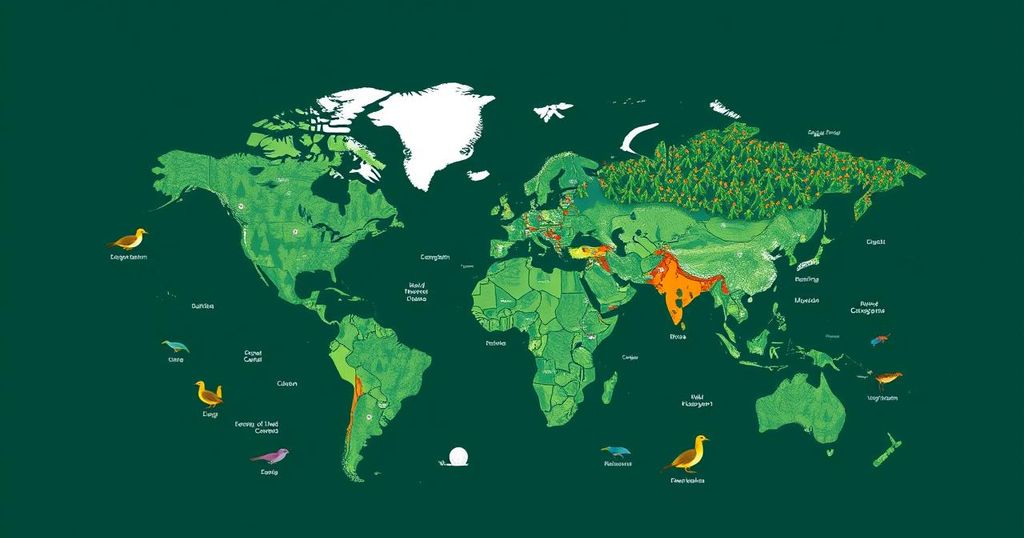The 16th Conference of the Parties (COP16) to the Convention on Biological Diversity will take place in Cali, Colombia, from October 21 to November 1, 2024. The International Fund for Animal Welfare (IFAW) is advocating for international collaboration to jointly address biodiversity loss and climate change, emphasizing the importance of integrating efforts at the summit. Marine biodiversity’s crucial role in climate regulation is highlighted, alongside the need for new guidelines that incorporate wildlife conservation into climate strategies. Key events and commitments may set a precedent for future discussions, particularly leading up to COP30 in 2025.
The 16th Conference of the Parties (COP16) to the Convention on Biological Diversity (CBD) will convene in Cali, Colombia from October 21 to November 1, 2024. This crucial gathering of global leaders and environmental experts is being viewed as a critical juncture for addressing the simultaneous crises of biodiversity loss and climate change. The International Fund for Animal Welfare (IFAW) emphasizes the necessity for robust international collaboration, underscoring that the dual crises cannot be effectively approached in isolation. Matt Collis, IFAW’s Senior Director of Policy, articulated this viewpoint, asserting, “We cannot solve either the climate crisis or biodiversity loss without addressing the other. COP16 is a pivotal moment to ensure that national and international efforts to protect biodiversity and combat climate change work in tandem, laying the groundwork for the future.” COP16 is anticipated to set a precedent for subsequent global environmental negotiations, including the forthcoming United Nations Framework Convention on Climate Change (UNFCCC) COP30, where nations will be required to update their strategies for addressing climate challenges. The 2023 COP28 Joint Statement on Climate, Nature, and People, endorsed by the presiding figures of the Rio Conventions and a range of global coalitions, has already emphasized the critical need for a unified strategy. IFAW has urged the Parties at COP16 to incorporate these commitments into the conference’s conclusions, especially regarding the high-level discussions and the forthcoming Cali Declaration. Additionally, the protection of marine and coastal biodiversity emerges as a vital concern, given its essential contribution to both wildlife conservation and human welfare. These marine ecosystems not only sustain extensive biodiversity but also play a pivotal role in climate regulation, including carbon absorption and weather stabilization. Unfortunately, they are increasingly vulnerable to human activity and climate change effects. “Healthy oceans are the foundation of a healthy planet. They absorb carbon, mitigate climate impacts, and support rich biodiversity,” remarked Collis. The imperative for COP16 is to prioritize the safeguarding of marine environments to enable them to maintain these critical functions against escalating climate pressures. Emphasizing the urgency of the situation, Collis stated, “Time is running out to tackle the intertwined crises of biodiversity loss and climate change, but COP16 offers hope. By ensuring that biodiversity and climate efforts are aligned at every level, we can make meaningful progress. The future of our planet depends on it.” IFAW will also host a notable side event entitled “Leveraging wildlife conservation and rewilding to supercharge climate mitigation and adaptation” on October 24 at 16:30 COT, focusing on the pivotal role wildlife conservation plays in climate change interventions. The event will mark the launch of new guidelines by IFAW to facilitate governments in incorporating wildlife conservation into their climate strategies.
The interconnected issues of biodiversity loss and climate change represent two of the most pressing environmental challenges facing the world today. The Convention on Biological Diversity (CBD) aims to promote sustainable development and protect the planet’s biological resources. COP16 serves as a significant venue for stakeholders to come together and forge actionable plans and commitments that will address these crises in an integrated manner. The urgency of the situation is reinforced by various international agreements, such as the Joint Statement from COP28, calling for a cohesive approach to environmental conservation and climate action. Marine ecosystems, in particular, are crucial for both biodiversity and climate mitigation, yet they face alarming threats from a range of anthropogenic activities.
In summary, the upcoming COP16 in Cali, Colombia, represents a crucial opportunity for global leaders to unify their efforts in addressing the interrelated crises of biodiversity loss and climate change. IFAW’s call for collaboration stresses the necessity of integrating these challenges into a coherent strategy. The outcomes of this conference may well shape global environmental policy for years to come, particularly in light of the impending COP30 next year. Stakeholders are urged to advocate for the protection of marine biodiversity and ensure that wildlife conservation is acknowledged as a vital component of climate action strategies, in order to foster a resilient and sustainable future for our planet.
Original Source: www.ifaw.org






